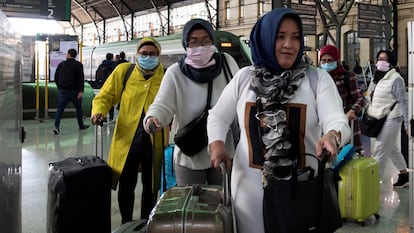Spain considers tougher measures amid rise in coronavirus infections
The Health Ministry has not ruled out restricting public gatherings if the local spread of Covid-19 gets out of control

Authorities in Spain are considering more restrictive measures against the Covid-19 coronavirus after two new locally acquired cases surfaced in Madrid on Thursday.
A total of 34 cases had been registered in Spain by Friday afternoon since the global epidemic broke out. Of those, 32 were detected this week after hospitals adapted their criteria for testing and began checking patients hospitalized with pneumonia. Two other patients who fell ill in late January and early February have since been discharged.
Five cases have been diagnosed in Madrid, six in the Canary Islands, three in Catalonia, one in the Balearic Islands, one in Aragón, two in Castilla y León, seven in Andalusia and nine in the Valencia region. Of the 32 active cases, just one patient is in a serious condition, a 77-year-old man in the intensive care unit of Torrejón de Ardoz Hospital in the east of the Madrid region.
Three new cases were announced on Friday morning alone as the pace of detection picks up speed, with the number of infections practically doubling in 24 hours. The World Health Organization (WHO) on Friday raised its global risk assessment to “very high.”
The sudden surge has created a new scenario in which the Health Ministry is not ruling out limits on large gatherings of people, mirroring measures in other countries, where major cultural, religious, trade and sports events have been cancelled in a bid to contain the spread of the disease.
All of the new cases detected in Spain since yesterday involve people who were infected abroad, and so far there are only three people believed to have acquired the virus locally. This means that the situation is still one of “containment,” according to the health authorities.
We will do what the experts recommend, and that does not include closing the bordersHealth Minister Salvador Illa
“The scenario is evolving very rapidly, fundamentally in Italy and therefore also in Spain,” said Fernando Simón, head of the Coordination Center for Health Alerts and Emergencies, which answers to the Health Ministry.
Spanish health authorities are keeping the country on the lowest of three possible scenarios, “containment,” as long as there is no “uncontrolled community transmission” or “a massive influx of imported cases,” said Simón.
In Madrid, regional health authorities are adopting additional measures to “lighten the load of professionals and speed up the testing processes.” Before Saturday, the number of laboratories checking samples will be expanded from four to eight, and additional personnel will be brought in, said a department spokesperson.
Hospitalized patients with pneumonia and those in intensive care are now being tested for the virus, regardless of whether they traveled to China in the past weeks or not – until recently, this had been a condition for testing.
In some cases, it is preferable to overreact a little than allow this to overwhelm usFernando Simón, Coordination Center for Health Alerts and Emergencies
“We have to be very careful,” said Simón. “In some cases, it is preferable to overreact a little than allow this to overwhelm us.” The official said that if large groups start to be affected by local transmission, “we would have to opt for basic measures of social distance, such as reducing agglomerations of people.” But Simón underscored that this type of community spread has not been detected yet in Spain.
Health Minister Salvador Illa said on Thursday that there are no plans to close the borders. “We will do what the experts recommend, and that does not include closing down the borders,” he said at a meeting of the parliament’s health committee. “That’s what communist countries such as North Korea and Russia have done. What [experts] recommend is early detection, which is what we are doing.”
Strained services
Although authorities insist that the healthcare system is working well, a Madrid doctors’ association, AMYTS, has reported that the 112 emergency telephone services are struggling with the sudden increase in calls. The Medical Emergency Service (Summa) has admitted that the number of coronavirus-related calls doubled in one day, reaching 750 on Wednesday. Home visit teams and units have been reinforced to take samples from potential mild cases.
In Catalonia, a spokeswoman for the Medical Emergency Services (SEM) said that where they were getting 40 coronavirus-related calls at the beginning of the crisis, when the epidemic was mostly confined to the Chinese city of Wuhan, they received 1,500 on Wednesday.
English version by Susana Urra.
Tu suscripción se está usando en otro dispositivo
¿Quieres añadir otro usuario a tu suscripción?
Si continúas leyendo en este dispositivo, no se podrá leer en el otro.
FlechaTu suscripción se está usando en otro dispositivo y solo puedes acceder a EL PAÍS desde un dispositivo a la vez.
Si quieres compartir tu cuenta, cambia tu suscripción a la modalidad Premium, así podrás añadir otro usuario. Cada uno accederá con su propia cuenta de email, lo que os permitirá personalizar vuestra experiencia en EL PAÍS.
¿Tienes una suscripción de empresa? Accede aquí para contratar más cuentas.
En el caso de no saber quién está usando tu cuenta, te recomendamos cambiar tu contraseña aquí.
Si decides continuar compartiendo tu cuenta, este mensaje se mostrará en tu dispositivo y en el de la otra persona que está usando tu cuenta de forma indefinida, afectando a tu experiencia de lectura. Puedes consultar aquí los términos y condiciones de la suscripción digital.








































